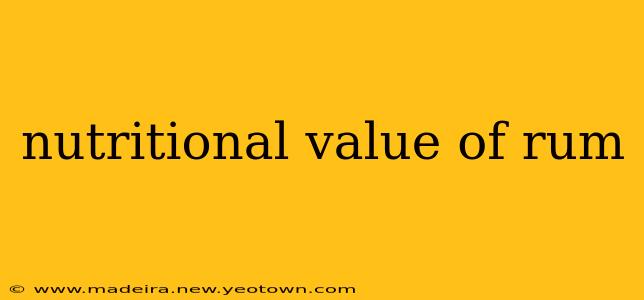Rum. The very word conjures images of sun-drenched beaches, lively parties, and the comforting warmth of a well-crafted cocktail. But beyond the delightful taste and social associations, what's the nutritional value of this beloved spirit? The short answer is: not much. Let's delve deeper into this often-overlooked aspect of rum.
Does Rum Have Any Nutritional Value at All?
While rum does contain a small amount of calories, primarily from its alcohol content, it offers virtually no significant vitamins, minerals, or other essential nutrients. It's primarily composed of ethanol, water, and trace compounds that contribute to its flavor and aroma. Unlike, say, wine, which boasts some antioxidants, rum's nutritional profile is remarkably sparse. Thinking of rum as a source of nutrients is akin to expecting a significant protein boost from a chocolate bar – it's simply not its purpose.
What are the Calories in Rum?
The caloric content of rum varies depending on the proof (alcohol percentage) and serving size. Generally, a standard 1.5-ounce shot of rum contains approximately 97 calories. These calories are "empty calories," meaning they provide energy but lack the essential vitamins and minerals our bodies need to thrive. Consuming excessive amounts of rum, therefore, can contribute to weight gain and other health problems.
Is There Any Health Benefit to Drinking Rum?
This is a tricky question, and the answer is a nuanced "maybe, but with caveats." Some research suggests moderate alcohol consumption might offer some cardiovascular benefits in certain populations. However, these potential benefits are often overshadowed by the significant health risks associated with excessive alcohol intake, including liver damage, increased risk of certain cancers, and alcohol dependence. The purported benefits of rum (or any alcoholic beverage) should never outweigh the considerable health risks, especially considering rum's lack of substantial nutritional value.
What are the Ingredients in Rum?
Rum is typically made from sugarcane byproducts, primarily molasses or sugarcane juice, which undergo fermentation and distillation. The specific ingredients and production methods contribute to the varied flavors and aromas of different rum types. However, these ingredients do not translate into a significant nutritional boost.
Is Dark Rum Healthier Than Light Rum?
There's a common misconception that dark rum is somehow more nutritious or beneficial than light rum. This isn't necessarily true. While dark rum often undergoes additional aging processes which might impart some minor changes to its chemical composition, these differences are negligible concerning nutritional value. Both light and dark rums remain essentially devoid of essential nutrients.
Conclusion: Enjoy Responsibly
Rum, like other alcoholic beverages, should be enjoyed responsibly and in moderation. While it might offer a fleeting sense of pleasure and social connection, it shouldn't be considered a source of nutritional value. Prioritizing a balanced diet rich in fruits, vegetables, whole grains, and lean proteins is far more effective for maintaining good health than relying on alcoholic beverages for nutrients. Remember, moderation is key when incorporating alcohol into your lifestyle.

